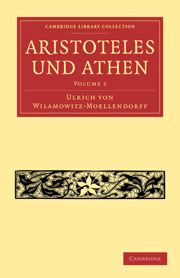Book contents
- Frontmatter
- Contents
- ZWEITES BUCH. Untersuchungen auf grund der aristotelischen Politie
- DRITTES BUCH. Beilagen
- 1 Die phratrie der Demotioniden
- 2 Der erste krieg mit Aegina
- 3 Die chronologie der pentekontaetie
- 4 Solons gedichte
- 5 Die attische skoliensammlung
- 6 Pindaros siebentes pythisches gedicht
- 7 Der process der Eumeniden
- 8 Die zeit der Thesmophoriazusen
- 9 Die rede für Polystratos
- 10 Die paragraphe und Lysias wider Pankleon
- 11 Lysias wider die kornhändler
- 12 Isokrates Panegyrikos 100–114
- 13 Die briefe des Isokrates
- 14 Demosthenes prooemium 55
- 15 Die gedichte des Aristoteles
- Sachregister
10 - Die paragraphe und Lysias wider Pankleon
Published online by Cambridge University Press: 10 November 2010
- Frontmatter
- Contents
- ZWEITES BUCH. Untersuchungen auf grund der aristotelischen Politie
- DRITTES BUCH. Beilagen
- 1 Die phratrie der Demotioniden
- 2 Der erste krieg mit Aegina
- 3 Die chronologie der pentekontaetie
- 4 Solons gedichte
- 5 Die attische skoliensammlung
- 6 Pindaros siebentes pythisches gedicht
- 7 Der process der Eumeniden
- 8 Die zeit der Thesmophoriazusen
- 9 Die rede für Polystratos
- 10 Die paragraphe und Lysias wider Pankleon
- 11 Lysias wider die kornhändler
- 12 Isokrates Panegyrikos 100–114
- 13 Die briefe des Isokrates
- 14 Demosthenes prooemium 55
- 15 Die gedichte des Aristoteles
- Sachregister
Summary
Die rhetorische terminologie unterscheidet als eine grundform der fragstellung, die für die gerichtsrede das erste hauptstück ist, die μετάληψις, die form- oder competenzfrage, ob das angezogene gesetz auf den rechtsfall passt, oder der process aus formellen gründen unzulässig ist. in dem ausgebildeten attischen rechte, wie es die demosthenischen reden zeigen, ist dies auch schon fast ganz durchgeführt. der beklagte kann den competenzconfliet erheben; dann klagt er wider die klagescbrift, die im falle seines sieges beseitigt ist. es muss aber angenommen werden, dass derselbe gerichtsbof, bei dem die erste klage erhoben war, aucb uber die competenzklage zu befinden zuständig ist. uns liegt es zwar nahe, eine besondere gattung von klagen, die παϱαγϱαφιϰαί, zu statuiren, wie denn die ordner der demosthenischen reden eine gattung von diesen als παϱαγϱαφιϰαί, ausgesondert haben, und gewiss wa'ren die thesmotheten ihrer ursprünglichen bestimmung nach geeignet gewesen, nach den bestehenden gesetzen, die sie doch kennen mussten, jeden competenzconfliet zu entscheiden, nötigenfalls daruber ein besonderes gericht zu berufen. es ist aber zu einem besonderen processe der παϱαγϱαϕή und einem besonderen gerichtshofe nicht gekommen, weil diese feinheit der juristischen distinction erst allmalich vor unsern augen durch die praxis gefunden wird.
- Type
- Chapter
- Information
- Aristoteles und Athen , pp. 368 - 373Publisher: Cambridge University PressPrint publication year: 2010



